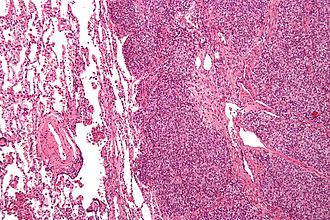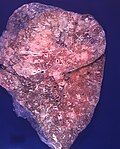Lung metastasis
(Redirected from Metastatic lung disease)
Jump to navigation
Jump to search
| Lung metastasis | |
|---|---|
| Diagnosis in short | |
 Lung metastasis (Ewing sarcoma). H&E stain. | |
| LM DDx | primary lung cancer (adenocarcinoma of the lung, squamous cell carcinoma of the lung, small cell carcinoma of the lung), pulmonary meningothelial-like nodule, carcinoid tumourlet, carcinoid lung tumour |
| IHC | TTF-1 (-ve useful if non-squamous), CK20 (+ve suggestive colorectal carcinoma), CK7 (-ve useful if non-squamous), GATA3 (+ve suggestive UCC) |
| Gross | lung nodules - typically multiple and peripheral |
| Site | lung |
|
| |
| Clinical history | +/-history of malignancy |
| Prevalence | relatively common |
| Radiology | peripheral lung lesions, typically multiple |
| Prognosis | usually poor |
| Clin. DDx | lung primary, abscess, multiple benign lung tumours as may be seen in DIPNECH |
| Treatment | dependent on primary site, occasionally surgical |
Lung metastasis, also pulmonary metastasis and metastatic lung disease, is relatively common and generally carries a poor prognosis.
General
- Relatively common.
Gross
- Typically peripheral, multiple, well-circumscribed & white/tan masses.
- May be diffuse without an obvious mass +/- septal thickening.
Microscopic
Features:
- Variable - dependent on site of origin.
- Colorectal adenocarcinoma - usually distinctive morphologically:
- Typically gland forming.
- Ellipsoid/elongated pseudostratified nuclei with moderate nuclear atypia.
- +/-Dirty necrosis.
- Typically gland forming.
- Others:
- Urothelial carcinoma - may mimic squamous cell carcinoma of the lung.
- Upper GI adenocarcinoma (e.g. gastric adenocarcinoma) - may mimic lung adenocarcinoma.
- Breast carcinoma - esp. ductal carcinoma of the breast - may mimic lung adenocarcinoma.
DDx:
- Primary lung tumour, e.g. lung adenocarcinoma, lung squamous cell carcinoma, small cell carcinoma of the lung.
- Pulmonary meningothelial-like nodule.[1]
- Carcinoid tumourlet.
- Carcinoid lung tumour.
Images
Lung metastasis (ES) - intermed. mag. (WC/Nephron)
IHC
- TTF-1 -ve/+ve.
- Negative suggestive of metastasis... unless it is squamous carcinoma.
- CK20 +ve/-ve.
- Positive in colorectal carcinoma - very useful.
- Negative in lung primaries.
- GATA3 +ve/-ve.
- Usu. +ve in urothelial carcinoma.
- Negative in lung primaries.[2]
- CK7 -ve/+ve.
- Positive in lung adenocarcinoma and small carcinoma of the lung.
- Positive in a number of other tumours - breast, upper GI tract, thyroid, mesothelioma, salivary gland.
- Negative in poorly differentiated carcinoma of the lung and squamous carcinoma of the lung.
See also
References
- ↑ Kfoury, H.; Arafah, MA.; Arafah, MM.; Alnassar, S.; Hajjar, W. (Feb 2012). "Mimicry of Minute Pulmonary Meningothelial-like Nodules to Metastatic Deposits in a Patient with Infiltrating Lobular Carcinoma: A Case Report and Review of the Literature.". Korean J Pathol 46 (1): 87-91. doi:10.4132/KoreanJPathol.2012.46.1.87. PMID 23109985.
- ↑ Chang, A.; Amin, A.; Gabrielson, E.; Illei, P.; Roden, RB.; Sharma, R.; Epstein, JI. (Oct 2012). "Utility of GATA3 immunohistochemistry in differentiating urothelial carcinoma from prostate adenocarcinoma and squamous cell carcinomas of the uterine cervix, anus, and lung.". Am J Surg Pathol 36 (10): 1472-6. doi:10.1097/PAS.0b013e318260cde7. PMID 22982890.





